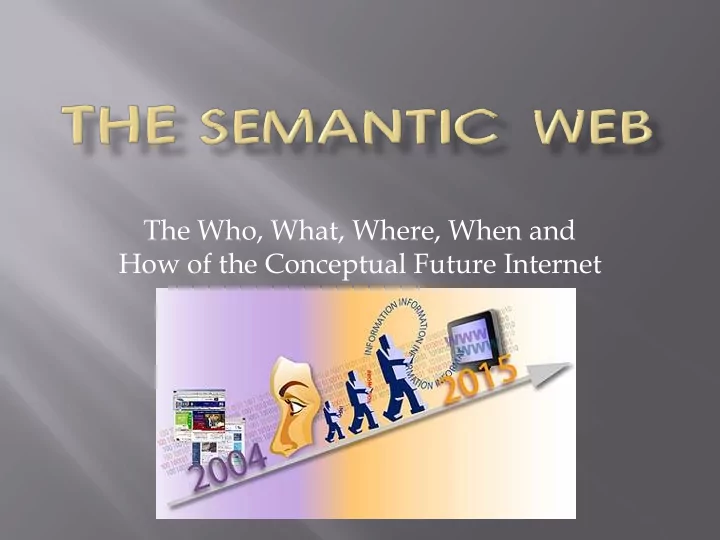

The Who, What, Where, When and How of the Conceptual Future Internet
Links lead to links that link to other links. Many people use only the first few links provided by search engines, much of the valuable information is not used. In particular, the science community remains affected.
The term Semantic Web originated from Tim Berners-Lee. Also known as Web 3.0, the Semantic Web is an extension of the World Wide Web. Content would be easier to disperse amongst a wider range due to its integration of current information applications creating a substantial data source.
CATEGORIZING BY CATEGORIZING BY LOGICAL KEYWORD UNDERSTANDING Reasons like a human Many options, but thousands of results. Context of the word is taken into consideration Many search engines like Google sort by popularity or Ex. (Block-The street, A solid “hits” piece of something, or to obstruct) Valuable and relevant information could be hidden
Basic Simple Wikipedia Example: “The sky has the color blue” Subject=“The Sky” Predicate= “has the color” Object= “blue”
OWL – distinguishes vocabulary and makes them machine readable RDF allows the user to input more scientific related material and receive information more relevant to their topic.
Created by Carnegie Mellon University NELL uses similar humanistic qualities to attain information. The algorithms are automated, so the programming input is simple. NELL unfortunately has problems distinguishing the contexts of words.
Can help relieve students of the hassle of searching for information, and create more time to actively understand, analyze and critically think about the information when quickly found. Institutions would also have better access to other universities’ scientific work with a more organized and detailed manner.
The United States of America, New Zealand, United Kingdom, and Australia have been opening up their government data. Creation of Linked Data replenishes the interest of the computer science community. Linked Data uses the web to publish and connect data using RDF.
Needs more support Needs funding Users must learn basic programming skills Governments need to share data Mandatory to be free or low cost like the current web
Recommend
More recommend